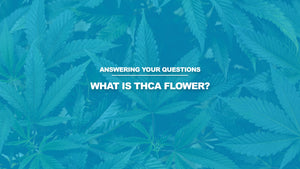What Is THCA Flower?
Jan 08, 2024
Introduction
In the vast realm of cannabinoids found in the hemp plant, one intriguing compound has been gaining attention for its unique properties — Tetrahydrocannabinolic Acid, or THCA. While it shares a close relationship with the well-known THC (Tetrahydrocannabinol), THCA itself offers a distinct profile that is garnering interest from hemp enthusiasts and researchers alike. In this comprehensive exploration, we will delve into the intricacies of THCA, seeking to answer the fundamental question: What is THCA?
A Closer Look at THCA Flower
Tetrahydrocannabinolic Acid, or THCA, is a naturally occurring compound found in the trichomes of the hemp plant. Unlike its counterpart THC, THCA is non-psychoactive, meaning it does not induce the euphoric effects commonly associated with hemp consumption. In its raw form, THCA flower presents itself as a precursor to THC and undergoes a transformation through decarboxylation, a process triggered by heat.
The distinctive characteristic of THCA lies in its potential therapeutic properties without the psychotropic effects, making it a subject of interest for those seeking alternative cannabinoids.
THCA vs. THC - Understanding the Difference
While both THCA and THC share a common precursor, they diverge in their effects on the human body. THC is renowned for its psychoactive properties, often responsible for the "high" associated with hemp use. On the other hand, THCA, in its raw state, does not produce these intoxicating effects.
The process of decarboxylation, typically activated by heat through methods like smoking or vaporizing, transforms THCA into THC. This conversion is a key factor in the varying effects of hemp products, and understanding the distinction between THCA and THC is crucial for consumers exploring different aspects of the plant.
Consuming THCA - Exploring Options
Given the non-psychoactive nature of THCA, consumers have diverse options for incorporating this cannabinoid into their wellness routines. Raw hemp, particularly in its juiced form, is one way to consume THCA without undergoing the decarboxylation process. However, due to its raw and unheated state, the THCA content remains in its non-intoxicating form.
Another emerging trend is the availability of THCA-dominant products, including tinctures and capsules, providing users with a controlled and measured approach to incorporating THCA into their daily routines.
The Importance of Quality and Purity
As interest in THCA grows, ensuring the quality and purity of products containing this cannabinoid becomes paramount. Consumers should seek products from reputable sources, backed by transparent testing and certifications. Quality assurance measures, including third-party lab testing, validate the potency and purity of THCA products, offering confidence to those exploring the potential benefits of this intriguing compound.
Conclusion
In the realm of cannabinoids, THCA stands out as a compound with unique characteristics and potential benefits. Understanding what THCA is and how it differs from THC provides consumers with insights into the diverse array of cannabinoids present in the hemp plant. As research continues and the hemp industry evolves, the exploration of THCA's properties is likely to uncover new facets of this enigmatic cannabinoid, shaping its role in the broader landscape of hemp wellness.

